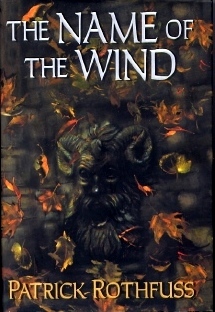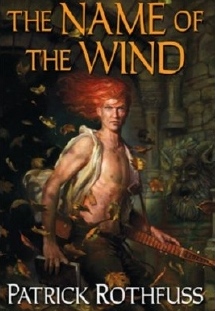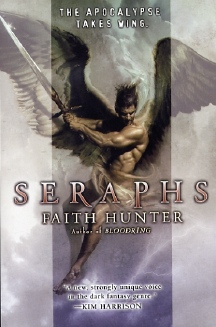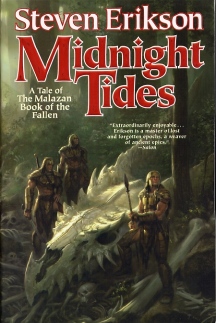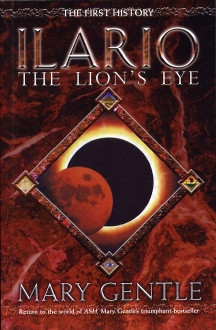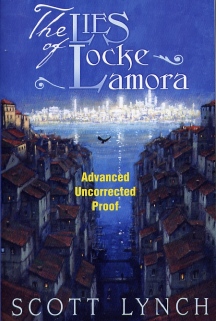|
|
|
|
This Just In...News
From The Agony Column
|
| |
|
04-28-07: Preview for Podcast of Monday, April 30, 2007: Don't
press that SEND button.
Here's
an MP3 preview
of the Monday April 30, 2007 podcast for The Agony Column. Enjoy!
|
|
04-27-07: Mea
Culpa, I Was Wrong : UPDATED
|
No More Slabs
With Abs, A Fabio Fatwa
I was wrong, so
wrong. I offer readers and Penguin Putnam my humble, my most humble
appy-polly-loggies. I hope that it's not too late to change course,
I hope that maybe we can all learn from my most heinous mistake and
go forth to build a better world.
A fantasy world, where the covers of fantasy novels don’t have to look
like the male equivalent of a Victoria's Secret catalogue or the
centerfold from a bodybuilding magazine.
I'm getting ahead of myself in my abject sorrow, so let me do some 'splainin'.
It was almost exactly a month ago when
I wrote about 'The Name of the Wind', an outstanding new fantasy novel
by Patrick Rothfuss. And now to look at it, my comments
were so innocent. In the caption for the cover scan, I described the DJ illustration,
which I had to tweeze in order for it to even be visible, as "blurry
clip art".
That image has since been "corrected".
In the same manner, the Hindenburg corrected the commercial applications
of the blimp.
I did say in the body of my article that and I quote my own bad self here: "I'm
glad to see that neither novel sports a cover featuring muscle-bound swordsmen
slicin'-n'dicin' an angry dragon while a buxom babe hangs breathlessly (and
for the most part, clotheslessly) in the background".
But still, that's no excuse. I should have hailed the original cover of 'The
Name of the Wind', I should have declared its genius, the brilliance of the
design that would not make a reasonable adult totally embarrassed to hand
the book to a twenty-something bookseller in order to purchase it.
Bring back the clip art, Penguin! Bring back the face buried in the leaves.
It does, I admit now, have a sense of mystery, a sense that anything might
be between these covers.
But I fear it is too late. Here are both the original and the fix the Penguin
has offered us:
|
|
|
Get
your hand off that erect sword fella. It's embarrassing.
|
What hath
I wrought? How could they have been so nimble as to get the new cover
commissioned, painted and printed in such a short interval? Please
tell me it was not my snarky little aside that resulted in such a pass!
But, it's not too late for 'Acacia', by David Anthony Durham. Please,
Random House / Doubleday, keep that cover art. It's fantastic, really!
Here are some examples of the sort of art we can expect to see on the average
American fantasy book covers:
|
|
|
Who
knew angels could have bad hair days?
|
I don’t thank that Faith Hunter is getting any favors
from the Fabio-flavored cover for 'Seraphs' (Roc / Penguin Putnam ; May,
2007 ; $14), her appropriately post-apocalyptic follow-up to the apocalyptic
'Bloodring'. Armies of darkness are gathering in hellholes, while Thorn St.
Croix learns to live among humans. Meanwhile, even angels are having bad
hair days. What's a girl to do? And even as I heartily congratulate Tor on
offering the entire Malazan Saga from Steven Erikson, published
in correct order, now offering book number five, 'Midnight Tides' (Tor Books
/ Tom Doherty Associates ; April 17, 2007; $15.95). I have to wonder if we'll
see a dragon skull runway in the next international fashion event.
I would say, "It's not pretty is it?" but alas it is pretty.
Pretty embarrassing that is, for the potential buyer who is not burying the
book amidst a thick sheaf of WrestleMania magazines. In fact the
art itself is fine; the artists are doing their jobs well. But the cover
concepts, the idea that in order to sell fantasy you have to show some guy
with a huge "sword" wearing leather diapers, that, yon publishers,
is disgusting.
It's time to put a stop to it. I'm calling for all major American Publishers
to issue a one-year moratorium on Slabs With Abs, a Fabio-alike cover fatwa.
It's time to stop the madness, to recognize that sales might actually increase
if we didn't find ourselves interested in books that present themselves with
images of steroid-fed beefcake in leather diapers, occasionally leavened
with pneumatic babes in leather bikinis. In the first place, such outfits
are clearly illogical wardrobe choices.
Can you imagine the chafing?
|
|
|
Novels
you can hand to the sales-clerk without embarrassment.
|
Let's see a return to sanity, let us follow the fine examples offered by
say, the UK release of Mary Gentle's latest novel, 'Ilario:
The Lion's Eye' (Victor Gollancz / Orion Books ; November 16, 2006 ; £14.99
/ £20.00). This novel acts as the preface to Gentle's monumentally
great 'Ash: A Secret
History', and the mere 663 pages incorporate both 'Under the Penitence'
and 'The Logistics of Carthage'
as well as about 550 more pages of surreal un-history. Chances are, the US
publishers will be booksplitting like crazy and chop this baby into three
or four MMPB's. Let's hope they chop up the excellent cover art by an uncredited
artist. My take is that readers should buy the UK trade pb version to read
and the UK hardcover version to keep for your archives. Gentle is a genius
who can immerse readers in unutterably hostile environments and make them
want to endure the cold with her compelling characters and stories. She's
never to be missed and should be on your auto-buy list.
Or perhaps Random House and Tor can split the services of Edward Miller,
who did such a nice job on the limited edition of 'The Lies of Locke Lamora'
by Scott Lynch. (Subterranean Press ; May 25, 2007 ; $75
/ 500 copies). It's gorgeous, fantastic and eschews all traces of bodybuilding
for actual buildings. Imagine that. Letting a beautiful painting and fine
literature sell the book instead of some sort of sleazy ... well, yikes.
So, Tor, Random House, are you listening? Get those talented painters and
artists you've got out of the paint-by-muscle Strip-o-Gram biz. Declare a
moratorium on Slabs With Abs. Issue the Fabio-alike Fatwa and help
save fantasy. Make it so that those of us who purchase fantasy fiction can
hold our heads high when we hand our bookseller the second installment of
the Rothfuss trilogy. (It had better STAY a trilogy, buddy!) Or if all else
fails, just give me back my blurry clip art. Please.
UPDATE: AW
wrote to tell me that there were two covers, shipped, he believes in equal
quantities. The blurry clip art is snipped
from the Fabio cover.
He also hastens to correct me that what I identified as a "sword" (sort
of) is instead a musical instrument. I'm avoiding the obvious puns. Most
interstingly, though Penguin PUtnam is distributing the book, the publisher
is DAW.
CM wrote to point out that the Art
Director for Tor, Irene Gallo, has a blog here that speaks to these issues.
I know there are all sorts of good reasons for why things are the way they
are. The reasons for my whinging is equally justifiable. It's fun.
|
| |
|
04-26-07: John Scalzi Founds 'The Last Colony'
|
Snark in Space
|
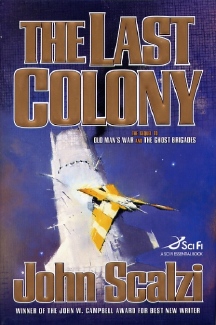 |
The
toe-tapping, series capping new novel from John Scalzi.
|
Yes, the Sc#$F*% Channel
gets some things right. They make one heck of a so bad it's good giant
snake movie and they have on occasion deemed
a Tor novel Essential that is, in fact, Essential. To be honest,
I haven’t
seen a giant snake movie lately, but I do have 'The Last Colony'
(Tor Books / Tom Doherty Associates ; April 24, 2007 ; $23.95) by John
Scalzi,
and this book is essential in all sorts of ways. In fact, essential
is the appeal of this trilogy concluding capper.
Following up and finishing the story of John Perry, whom we met in
'Old Man's War' and Jane Sagan, with whom we spent some quality time
in 'The
Ghost Brigades' and 'The Sagan Diary', 'The Last Colony' finds Perry
and Sagan with adopted daughter Zoe happy little Huckleberries, as
in Planet Huckleberry. Perry and Sagan
are the nice folks running a little corner of a colony steeped in Twainiana.
Their problems tend to involve goats, not killing aliens and extinguishing
worlds. It's nice.
But nice doesn't suit any of the three. So when duty calls in the form
of an assignment to run the whole shebang for a new colony being founded
for the first time by colonists, they answer. And before you can say Hickory
or Dickory, the names of the alien Obin who help tend their daughter Zoe,
they've set out to set foot on a strange new world. It should be simple
but as you might presume, it proves to be complicated.
But not complicated when it comes to the reading experience. I deem this
book essential not just because every other star in the science fiction
universe says it's great (it is), but rather because I think essential is a good description of the reason Scalzi is so much fun to read. His
prose it and his story are stripped clean, smoothed down to the essentials.
He packs more action into a 300 something page novel than some writers
manage to get in a 3,000 page trilogy. Everything is crystal clear. The
universe may be complicated and the aliens jockeying for the limited resources
in that universe may be complicated, heck, even the politics of the human
race are complicated, but in Scalzi's precise vision, all you get are the
essentials you need as a reader to plug yourself into the story and set
yourself loose at light speed. Scalzi is an essential writer to read because
he offers readers only the essentials they need to get out there in his
universe and have one hell of a good time.
The stripping-down, the polishing to perfection, make sure that Scalzi
never gets in his own way. Readers are just right there with the action,
and totally involved with the characters. Scalzi always steers his characters
towards the archetype, not the stereotype. It's a subtle distinction, but
Scalzi is so confident that we know everybody instantly, from the smarmy
politicians like Manfred Trujillo to the indispensable sidekicks like Savitri
Guntupalli.
Scalzi's essential style also makes sure his universe is never less
than eminently sensible, even when everyone in that universe is behaving
foolishly,
aliens and humans alike. Take for example, his brisk explanation of
how a planet is colonized. It's a joy to read such a clearly conceived
rationale,
and the info dump is clothed is Scalzi's other strong point, snarky,
funny dialogue that reads so fast that you barely have time to get
a grin on
before you've hit the next joke. And they’re not really jokes,
just snappy answers to questions smart or stupid, depending on which
character's doing the asking.
While Scalzi has done an admirable job of making each novel strong
enough to stand alone, give yourself a treat and read them in order.
This is it
for this trilogy, three short novels, the whole story in a timely manner
yet nicely standlone-ish. That, to my mind, is essential. Giant snake
movies are most assuredly included in the trivial joys of numbing one's
mind.
Science fiction so well-written as to seem inevitable is as essential
to our cultural health as it is to your continued mental health.
|
|
04-25-07: 'Best American Fantasy' Edited by Ann & Jeff
VanDerMeer, Series Editor Matt Cheney and 'Year's Best Fantasy 7' Edited
by David G. Hartwell & Kathryn Cramer
|
Whole Wide Worlds
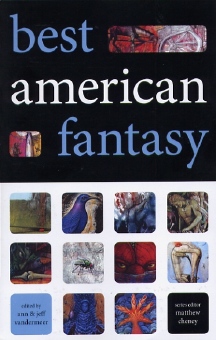 |
|
| Classy
look, eh? Not what you might expect for a book with the word
fantasy on the cover. |
Fantasy outsells
science fiction, but alas, not because of the incredible variety
of fiction one can find filed under fantasy. The two collections
of short stories here off a total of 49 stories, and no repeats between
them. 'Best American Fantasy' (Prime Books ; July 2007 ; $14.95)
is a series edited
by Matt Cheney with rotating guest editors, in this case, Ann
and Jeff VanDerMeer. 'Year's Best Fantasy 7' (Tachyon Books ; July 2007 ;
$14.95) offers a more
familiar format and the venerable editing skills of David G.
Hartwell and Kathryn Cramer. But together they paint a very different picture
of what
passes for fantasy these days. If you’re looking for hunky barbarian
warriors traipsing across a plain in search of a princess in a leather
bikini, these ain't that. But if you're looking for fiction where,
essentially, anything
goes, you've come to the right place.
Let's start out this article praising the small presses: Prime Books
and Tacyhon Publications – that brought us these books. It usta be
that we could expect our Big Bests
from
the folks in NY.
There are probably some fat ol' books waiting to blow into the big
box stores. But these two slim, trim and appealingly priced collections
will
do just
fine. They do have rather different slants, though. This year, at least,
'Best American Fantasy' trends much more towards the McSweeney's set
of highfalutin' literary fantasists, while 'Year's Best Fantasy 7'
offers a stable full of
familiar genre names writing stuff that bears little resemblance to
what comes into most minds when they hear the word "Fantasy".
In other words, if you want one, you want the other. Check out of reality
in late
June, say, and check back in when Fall rolls round, if you’re
able.
'Best American Fantasy' offers 29 stories. You get an introduction
by series editor Matt Cheney, another introduction by the VanDerMeers,
then
the stories,
contributor notes, recommended reading (a list of also-rans that might
have made it into a fatter version of this book if I don’t miss
my mark), a list of publications received, a publication history sourcing
the selected
stories, a page on the volume editors plus a page on the cover artist.
Let me compliment said cover artist, Scott Eagle. All fantasy fiction
should
have such fine work on the cover. It's thorough, logically organized
and very clean. As I noted above, these stories tend to be pulled from
the pages
of periodicals other than F&SF; in fact only one came from Analog.
Here you're going to find authors like Daniel Alarcon (Abraham Lincoln
Has Been
Shot' from Zoetrope), a favorite of one of my co-workers from Talk
of the Bay. You'll find Kevin Brockmeier's 'A Fable With Slips of White
Paper Spilling
From the Pockets'. In general, not a lot of names intimately familiar
to the world of SF&F. You'll find stories that fall under the rubric
of an expansive notion of fantasy, stories in which authors wandered
beyond
the confines of our workaday world. But also stories that somehow seem
part of that world, if that makes any sense, stories in which the world
you'll
return to after reading this article is tweezed by smart language.
|
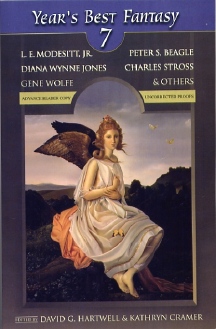 |
You
try scanning a book cover at 3:30 AM and see how you fare!
|
'Year's Best Fantasy
7' offers a list of authors more familiar to the genre fiction reader,
but is no less expansive when it comes to the
sorts of stories
you find. Here you're going to get a brief introduction by the volume
editors, and then just the stories, each with a paragraph of preface
about the origin
of the story with a "bit" about the author. Series editor Jacob
Weisman dials himself almost entirely out of the doings
but should certainly not be forgotten. Cover art by David M. Bowers
for YBF7 is quite fine as
well. Let me repeat myself and say that all fantasy fiction should
have such fine art on the cover. The story with a brief intro is
a familiar but enjoyable format for a "Year's
Best" and
the selections lean heavily on F&SF, Asimov's and
anthologies from familiar editors. This is not to say that the stories
offer
any less
variety. No,
you'll still find a selection that leans hard on fantasy-strange.
The collection leads off with Gene Wolfe and Charles Stross, just
to give
you an idea of
what you're in for. Essentially, a fantastic collection of the fantastic.
These two collections offer a stark contrast to what tends to leap
to mind when one hears the word "Fantasy" uttered in the
context of literary genres. These stories bear little resemblance
to the work
found between those
books best described as Slabs with Abs. I'll note that many Slabs
With Abs are not exactly what one might presume them to be, but that's
another
rant.
Today, I'm here to say you can get your fantasy literary by literary
authors (BAF), or literary by genre authors (YBF7). Like all generalizations,
those
descriptions miss the marks in lots of ways, but you're smart, you
get the idea. There's a whole lot of short-form Best Fantasy being
published,
most
of it sans swords and a cut above.
|
| |
|
04-24-07: Elizabeth Bear Catches the 'Undertow'
|
Science Fiction is the New Weird
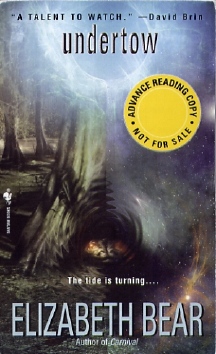 |
|
| Vaseline-on-the-lens-vision. |
Give me the uncategorizable
every time. As much as we may like labels and similarities, genres and
movements, the best stuff falls right
between
the cracks and often lands on the paperback racks. There's something
about that little mass-market paperback original that can really
spark your interest. It's a nostalgia thing, to be sure. Most of us
start our
book buying days at the paperback racks, because a kid selling ice
cream floats to people who walk down the street on a hot summer day
isn’t
pulling in the kind of money required to buy hardcovers. If you want
to read, then at the outset, at least, reading comes first. Format
comes later, when income becomes disposable and you've got shelves
to put all
those books on. But first, you just want the pages, and in a form
you can shove in a pocket, purse, or backpack easily. Bantam Dell has
been
doing this for decades, and they've not stopped yet. So when you
see a copy of the new novel by Elizabeth Bear, 'Undertow' (Bantam Dell ;
August 7, 2007 ; $6.99), you can ask yourself how you might have felt
back in the day, seeing say, 'Do Androids Dream of Electric Sheep?' by
Philip K. Dick on the racks. Might have looked a bit trashy. And it might
one day be collected in the American Library as a literary classic.
Now, I kind of like the cover illustration of Bear's new novel, by
the Ubikquitus "TK". It suits the mood of a novel of shimmering,
uncategorizable weirdness that mixes up aliens and magic, cops, criminals
and inter-planetary conspiracies. But let's just admit that, well,
it's not going to jump out at those looking for a character-driven,
present-day domestic drama about a family trying to make ends meet.
Too bad for
those readers. Bear writes circles around reality and offers readers
a character-driven novel in which just a few of the characters are
not, like,
human. Don’t tell me you think all your neighbors are human!
I sure as heck have my doubts, and I can say with confidence my neighbors
feel
the same.
'Undertow' is the kind of novel that deftly defies categorization while
neatly fitting into lots of categories. Novo Haven is a frontier planet
run
by a tyrannical family. André Deschênes is your not-so
garden-variety assassin who just wants to learn a new skill. You call
it magic, I call
it science, whatever it is it is pretty damn weird. Maybe not as weird
as the aliens of Novo Haven. You look at 'em and think: Critters. You
don’t
look at 'em and think: rich inner lives. But if you’re reading
Bear's book, you get it all and more. Toe-tapping tension, rich inner
alien lives,
humans as weird as your neighbors.
Alas, my pigeonholing instinct is strong, and what fascinates me about
this book is how it uses science fiction as a platform from which to
launch and very "New Weird" story. I can't claim encyclopedic
knowledge of the now-old New Weird aesthetic, but the shattered remains
of my tiny
brain seem to suggest that most of the works used sort-of fantasy or
sort-of horror to launch their explorations. Bear starts out with a
straightforward
planetary romance, so to speak, but before you can even wrangle like
a drop of meaning out of that phrase she's got you into someplace,
er, bearing
more than a passing resemblance to those hallowed climes of the New
Weird. Should you even be bothering to think along those lines. But
my guess is,
my hope is that most readers of this book would not be worrying about
weirds new or old. I just hope that those smart teenagers, the actual
future of
science fiction as opposed to any author, the kids who would
just as soon spend their money on books as video games, are finding
this book.
Maybe
Dad can just leave a spare copy laying about. Maybe enterprising retailers
can shove some copies next to the stacks of mind-numbing serials that
are so heavily exposed that the black hole of their gravitic pull threatens
to suck in all literature. 'Undertow' catches something and one hopes
that
it is readers.
|
| |
|
04-23-07: A 2007 Interview With Jonathan Lethem
|
"You have
to be a fake before you can be real"
Ah, words to live
by, especially when you've been as fake as I have been for as long as
I have been. They are truly heartening hear, especially
from a writer who managed the unlikely feat of winning both the Philip
K. Dick Award, the National Book Critics Circle Award and a MacArthur
Foundation Fellowship. That pretty much narrows down the list to one,
Jonathan Lethem, whose latest book, 'You Don't Love
Me Yet', tells the story of a rock band trying to be real. There's just
a little problem
in that their bassist sort of borrowed key phrases from her husky, fascinating
but repellent paramour, Carl the Complainer. She turned those fragments
over to the band's blocked genius, who unblocks for long enough to write
up some hot songs. Carl attends a premiere performance of said songs
which go over spectacularly well. And since Carl coins catchy phrases
for a living, he's got a right to feel ripped off. But instead, he just
wants to join the band. Don’t we all?
 |
Oh
yes we do. |
Lethem's novel is a stripped down wonder, a one-sitting back porch beach-read
that resonates like a catchy pop tune you'll never forget. It's a remarkable
contrast to his previous novel 'The
Fortress of Solitude', and according
to him, most similar to his other romantic comedy, 'As
She Crawled Across the Table'. I had a delightful conversation with
Lethem, talking about his new novel and his love of language, how he
sanded down the book to
make it seem almost slippery. Even though there are a lot of serious
thoughts behind his new book, they're so integral to the plot that they
don’t stick out. They just stick in your mind.
Lethem and I talked about his recent essay for Harper's Magazine, 'The
Ecstasy of Influence: A Plagiarism', which touches on a lot of fascinating
themes you'll find embedded in 'You Don't Love Me Yet'. You probably
won't be surprised to hear it brings up yet another variant of Lethem's
favorite friend amnesia, in this case cryptomnesia. He's very interested
in the public domain of ideas and images, to the point of offering up
stories and song lyrics for use on his Promiscuous
Materials Project website. His website is an absolute hoot, and superbly designed. The
hypnotic homepage reloads are in fact interfering with my writing of
this article, so I'm going to turn them off now.
There. This week, then, obviously, I'm offering up another podcast, this
time, Jonathan Lethem in glorious
high-rez MP3 format, or gritty, grainy,
down-n-dirty RealAudio,
for those who like their art oh-so-vernacular. Take your pick. Keep your
ears glued to the stream, because I'm not going
to give away the secret to his super-exciting novel-in-progress,
a dream project for readers of this column. I will mention that we talked
about: new novel (check), DRM, copyright and copyfight issues (check),
his job editing the new American Library collection of Philip K. Dick
swingin' sixties best-of, and yes, that new novel. Lethem and I talked
about Lewis Hyde's book, 'The Gift', and what Lethem calls the gift component
of art. This podcast is surely not art, but it most certainly is my gift
to you. Enjoy this fine morning. Or at least, fake it.
|
| |
|
|


